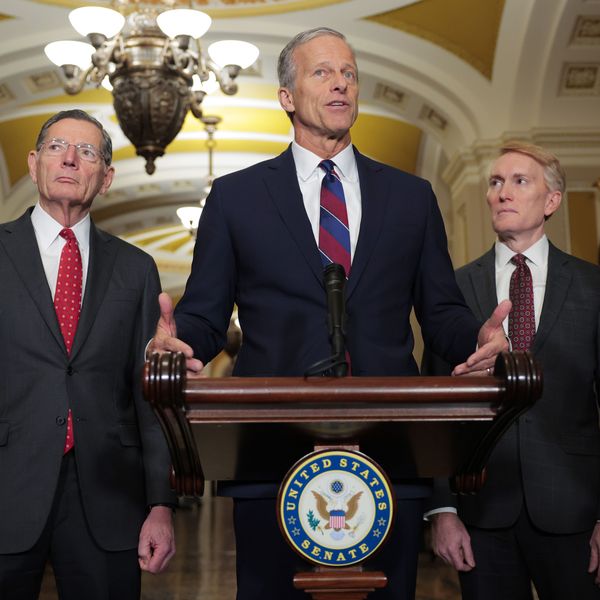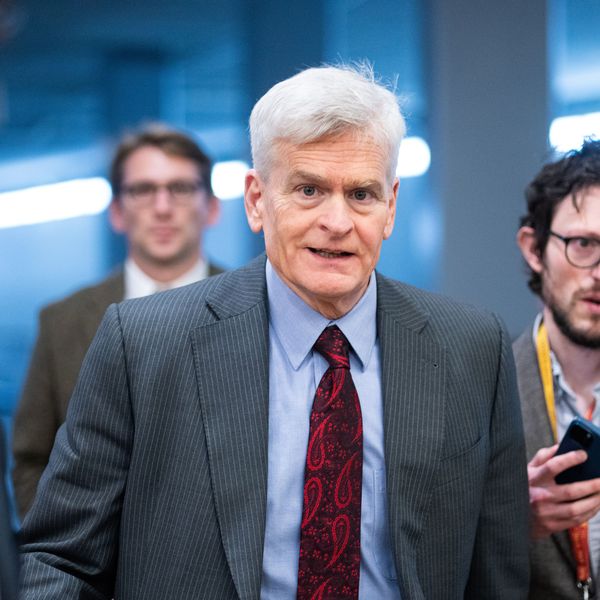
Millions of Americans may not be able to easily access healthcare if Congress continues to withhold funding from community health clinics. (Photo: Pixnio/Flickr/cc)
'Crisis No One Is Talking About': GOP Threatens Healthcare of 26 Million People
Sens. Sanders and Baldwin demand urgent action as thousands of community health centers face uncertain future without federal funds
While the Republican-controlled Congress finally approved funding for the Children's Health Insurance Program in late January after it lapsed in September, lawmakers have failed to renew funding for thousands of community health centers, which also expired in the fall--a move that "has quietly created a new healthcare crisis for 26 million Americans."
"If Congress doesn't fund community health centers," Vox's Sarah Kliff details in a report published Friday, "thousands are expected to close."
In response to Kliff's report, Sen. Bernie Sanders (I-Vt.)--who has introduced legislation to create a "Medicare for All" system that would guarantee healthcare for all Americans--and Sen. Tammy Baldwin (D-Wis.), a co-sponsor on Sanders' bill, called for immediate action by lawmakers.
\u201cThis is the health care crisis no one is talking about. Congress must act immediately to fully fund community health centers. https://t.co/vDflzD0qrQ\u201d— Bernie Sanders (@Bernie Sanders) 1517580043
\u201cIt\u2019s been over 4 months since funding for Community Health Centers expired. 26 million Americans, including 300,000 Wisconsinites rely on community health centers to get the care they need. We have to take action to fund them now. \nhttps://t.co/2TDeo1ml4M\u201d— Sen. Tammy Baldwin (@Sen. Tammy Baldwin) 1517590921
Although community health centers began as an experiment in a handful of states in the 1960s, they have vastly expanded in recent years with support from the previous two administrations. The Obama administration increased funding as the Affordable Care Act (ACA) went into effect, and when ACA funding lapsed in 2015, Congress opted to fund not only the children's healthcare program, or CHIP, but also the community health centers.
With this continuous support from the federal government, several centers have popped up all across the country, often serving low-income patients in rural areas. "The number of patient visits grew from 19.5 million in 2010 to 26.5 million in 2016," Kliff writes. "An additional 200 community health centers opened and increasingly expanded their work into dental and mental health services."
Now, however, many of the centers face an uncertain future. Although they "still have other income streams, including other grants, as well as reimbursements from the insurance plans (often Medicaid) that cover 77 percent of their patients," Kliff notes that "the loss of the federal dollars currently at stake--$3.6 billion in annual funding--would be a significant hit."
While "congressional aides on both sides of the aisle say they expect community health center funding to be attached to the next must-pass piece of legislation" that lawmakers need to approve before Feb. 8 to avoid another government shutdown, there have been no guarantees from leaders in Congress that the next spending bill will include money for the centers.
An Urgent Message From Our Co-Founder
Dear Common Dreams reader, The U.S. is on a fast track to authoritarianism like nothing I've ever seen. Meanwhile, corporate news outlets are utterly capitulating to Trump, twisting their coverage to avoid drawing his ire while lining up to stuff cash in his pockets. That's why I believe that Common Dreams is doing the best and most consequential reporting that we've ever done. Our small but mighty team is a progressive reporting powerhouse, covering the news every day that the corporate media never will. Our mission has always been simple: To inform. To inspire. And to ignite change for the common good. Now here's the key piece that I want all our readers to understand: None of this would be possible without your financial support. That's not just some fundraising cliche. It's the absolute and literal truth. We don't accept corporate advertising and never will. We don't have a paywall because we don't think people should be blocked from critical news based on their ability to pay. Everything we do is funded by the donations of readers like you. Will you donate now to help power the nonprofit, independent reporting of Common Dreams? Thank you for being a vital member of our community. Together, we can keep independent journalism alive when it’s needed most. - Craig Brown, Co-founder |
While the Republican-controlled Congress finally approved funding for the Children's Health Insurance Program in late January after it lapsed in September, lawmakers have failed to renew funding for thousands of community health centers, which also expired in the fall--a move that "has quietly created a new healthcare crisis for 26 million Americans."
"If Congress doesn't fund community health centers," Vox's Sarah Kliff details in a report published Friday, "thousands are expected to close."
In response to Kliff's report, Sen. Bernie Sanders (I-Vt.)--who has introduced legislation to create a "Medicare for All" system that would guarantee healthcare for all Americans--and Sen. Tammy Baldwin (D-Wis.), a co-sponsor on Sanders' bill, called for immediate action by lawmakers.
\u201cThis is the health care crisis no one is talking about. Congress must act immediately to fully fund community health centers. https://t.co/vDflzD0qrQ\u201d— Bernie Sanders (@Bernie Sanders) 1517580043
\u201cIt\u2019s been over 4 months since funding for Community Health Centers expired. 26 million Americans, including 300,000 Wisconsinites rely on community health centers to get the care they need. We have to take action to fund them now. \nhttps://t.co/2TDeo1ml4M\u201d— Sen. Tammy Baldwin (@Sen. Tammy Baldwin) 1517590921
Although community health centers began as an experiment in a handful of states in the 1960s, they have vastly expanded in recent years with support from the previous two administrations. The Obama administration increased funding as the Affordable Care Act (ACA) went into effect, and when ACA funding lapsed in 2015, Congress opted to fund not only the children's healthcare program, or CHIP, but also the community health centers.
With this continuous support from the federal government, several centers have popped up all across the country, often serving low-income patients in rural areas. "The number of patient visits grew from 19.5 million in 2010 to 26.5 million in 2016," Kliff writes. "An additional 200 community health centers opened and increasingly expanded their work into dental and mental health services."
Now, however, many of the centers face an uncertain future. Although they "still have other income streams, including other grants, as well as reimbursements from the insurance plans (often Medicaid) that cover 77 percent of their patients," Kliff notes that "the loss of the federal dollars currently at stake--$3.6 billion in annual funding--would be a significant hit."
While "congressional aides on both sides of the aisle say they expect community health center funding to be attached to the next must-pass piece of legislation" that lawmakers need to approve before Feb. 8 to avoid another government shutdown, there have been no guarantees from leaders in Congress that the next spending bill will include money for the centers.
While the Republican-controlled Congress finally approved funding for the Children's Health Insurance Program in late January after it lapsed in September, lawmakers have failed to renew funding for thousands of community health centers, which also expired in the fall--a move that "has quietly created a new healthcare crisis for 26 million Americans."
"If Congress doesn't fund community health centers," Vox's Sarah Kliff details in a report published Friday, "thousands are expected to close."
In response to Kliff's report, Sen. Bernie Sanders (I-Vt.)--who has introduced legislation to create a "Medicare for All" system that would guarantee healthcare for all Americans--and Sen. Tammy Baldwin (D-Wis.), a co-sponsor on Sanders' bill, called for immediate action by lawmakers.
\u201cThis is the health care crisis no one is talking about. Congress must act immediately to fully fund community health centers. https://t.co/vDflzD0qrQ\u201d— Bernie Sanders (@Bernie Sanders) 1517580043
\u201cIt\u2019s been over 4 months since funding for Community Health Centers expired. 26 million Americans, including 300,000 Wisconsinites rely on community health centers to get the care they need. We have to take action to fund them now. \nhttps://t.co/2TDeo1ml4M\u201d— Sen. Tammy Baldwin (@Sen. Tammy Baldwin) 1517590921
Although community health centers began as an experiment in a handful of states in the 1960s, they have vastly expanded in recent years with support from the previous two administrations. The Obama administration increased funding as the Affordable Care Act (ACA) went into effect, and when ACA funding lapsed in 2015, Congress opted to fund not only the children's healthcare program, or CHIP, but also the community health centers.
With this continuous support from the federal government, several centers have popped up all across the country, often serving low-income patients in rural areas. "The number of patient visits grew from 19.5 million in 2010 to 26.5 million in 2016," Kliff writes. "An additional 200 community health centers opened and increasingly expanded their work into dental and mental health services."
Now, however, many of the centers face an uncertain future. Although they "still have other income streams, including other grants, as well as reimbursements from the insurance plans (often Medicaid) that cover 77 percent of their patients," Kliff notes that "the loss of the federal dollars currently at stake--$3.6 billion in annual funding--would be a significant hit."
While "congressional aides on both sides of the aisle say they expect community health center funding to be attached to the next must-pass piece of legislation" that lawmakers need to approve before Feb. 8 to avoid another government shutdown, there have been no guarantees from leaders in Congress that the next spending bill will include money for the centers.

